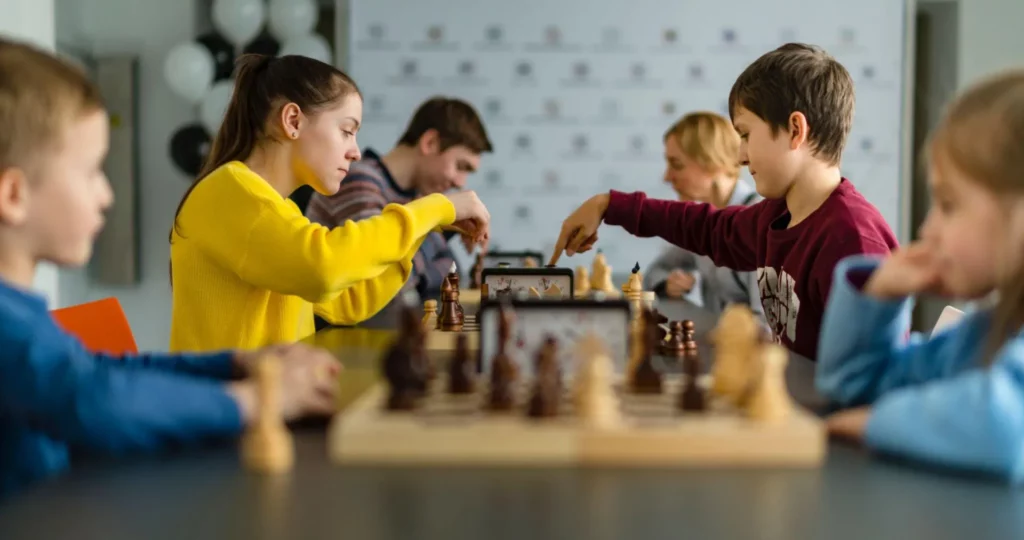Tournament Rules

Players aren’t expected to memorize the entire rule book. Simply understanding some of the most important rules is more than enough to confidently play in any tournament.
At the Start of the Game
1. When the tournament director announces that it is time to start the clocks, it is proper to first shake hands and then the player with the black pieces starts White’s clock.
2. If the player with the white pieces is not present, Black should start White’s clock.
3. If the player with the black pieces is not present, White should start his or her own clock, make a move, and then start Black’s clock
Conduct During the Game
1. During the game players should never discuss their game with anyone. Players are allowed to get up and walk around e.g. to use the restroom or go out or get a drink of water.
2. Announcing check is not required, on the other hand, it is not prohibited. Announcing check is usually a sign that one is a beginner, at higher level tournaments, it is rare to hear anyone announce check.
3. Most tournaments require players to record their moves. This helps provide evidence of what has occurred during the game in case of a dispute. In order to record your game, you will need to learn how to read and write chess notation.
4. Aside from writing down your next move on your score sheet, one is not allowed to make notes or write down chess analysis. Also, one should not read chess literature during a game.
When in doubt, ask!
Never hesitate to ask the Tournament Director (TD) or any of the Arbiters (Chess Referee) to clarify any confusion you may have about the rules. If you and an opponent have a disagreement, stop the clocks, find an arbiter, and ask him to make a ruling.
If you touch a piece, you must move it.
This is known as the touch-move rule and is often a source of difficulty for players new to tournaments. It also requires you to capture an opponent’s piece if you touch it. This rule only applies if you can make a legal move with the piece you touched.
There are some exceptions. If you accidentally brush a piece, you are not required to move it. If a piece is awkwardly placed, you can adjust it; simply say “I adjust” before touching the piece to make it clear to your opponent that you don’t intend to move it.
In most chess tournaments, you’ll be able to walk around the playing area and watch other games, provided you do so quietly. Observers are forbidden from telling players anything about their games, even if they notice a violation of the rules.
In recent years, new rules have been written to deal with loud phones, which can break the concentration of chess players. If your phone rings in the playing area, you will have to forfeit your game i.e. you will be declared lost.
Tournament chess is played with time limits, which vary by event. Time is kept by using a chess clock. Using these clocks can be distracting at first, but will soon become second nature. Most importantly, remember to hit your clock after each move you make – this stops your clock and starts your opponent’s time. Also, be sure to use the same hand to move
your pieces and touch the clock.
1. After the game is over, irrespective of the result, one should shake hands with one’s opponent.
2. Win, lose, or draw, both players are required to make sure the proper result is recorded. If you’re not sure where to mark down your result, ask an Arbiter for help.
1. The proper way to resign a game is to say, “I resign” and one may then also stop both clocks.
2. Then one should shake hands with one’s opponent, and congratulate him or her for a won game.
3. It is rude and unsportsmanlike to abandon a lost position without resigning, so as to allow your clock to run out of time.
4. It is generally considered proper chess etiquette to resign clearly lost positions. The proper time to resign should vary with one’s chess ability. Most beginners should probably play on until they are checkmated. But more advanced players should resign clearly lost positions when they are certain that if they were on the other side of the position, they could beat even a master.
Withdrawing from a Tournament or Missing a Round
If you need to withdraw from a tournament, or miss a round, for any reason, you should notify the tournament director well in advance of the round you must skip. It is best to give such notice both verbally and written since tournament directors are very busy and are prone to forget such details unless written down.
